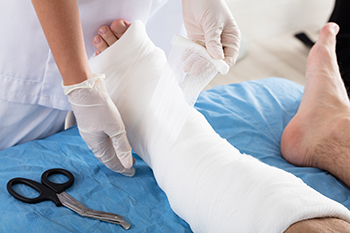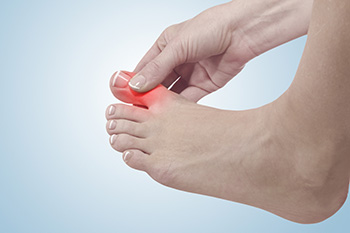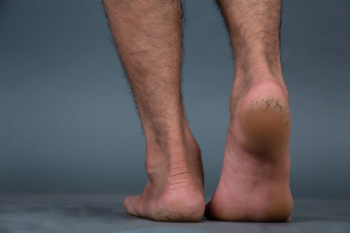Items filtered by date: March 2025
Total Contact Casts Can Help With Diabetic Ulcers

Total contact casts are extremely effective for managing diabetic foot ulcers, particularly those caused by neuropathy. These casts distribute pressure evenly across the foot and ankle, to reduce stress on the ulcerated area and promote healing. By immobilizing the foot, a total contact cast also limits excessive movement, which can further aggravate wounds. Total contact casts ensure consistent pressure relief since patients cannot remove them, leading to higher healing rates. These casts are particularly beneficial for non-infected ulcers where circulation remains adequate. While total contact casts offer significant advantages, they require careful monitoring to prevent complications like skin irritation or new pressure points. A podiatrist can assess whether a total contact cast is appropriate based on wound severity, circulation, and overall foot health. Regular evaluations are needed to ensure proper healing and adjust the cast. If you are experiencing foot problems related to diabetes, it is suggested that you schedule an appointment with a podiatrist to see if a total contact cast is right for you.
Diabetic foot care is important in preventing foot ailments such as ulcers. If you are suffering from diabetes or have any other concerns about your feet, contact one of our podiatrists from ABC Podiatry. Our doctors can provide the care you need to keep you pain-free and on your feet.
Diabetic Foot Care
Diabetes affects millions of people every year. The condition can damage blood vessels in many parts of the body, especially the feet. Because of this, taking care of your feet is essential if you have diabetes, and having a podiatrist help monitor your foot health is highly recommended.
The Importance of Caring for Your Feet
- Routinely inspect your feet for bruises or sores.
- Wear socks that fit your feet comfortably.
- Wear comfortable shoes that provide adequate support.
Patients with diabetes should have their doctor monitor their blood levels, as blood sugar levels play such a huge role in diabetic care. Monitoring these levels on a regular basis is highly advised.
It is always best to inform your healthcare professional of any concerns you may have regarding your feet, especially for diabetic patients. Early treatment and routine foot examinations are keys to maintaining proper health, especially because severe complications can arise if proper treatment is not applied.
If you have any questions please feel free to contact our office located in Columbus, OH . We offer the newest diagnostic and treatment technologies for all your foot and ankle needs.
How to Manage Gout

Gout is a type of arthritis that occurs when uric acid builds up in the body, forming crystals in the joints. It commonly affects the big toe but can also impact other joints. The symptoms include intense, sudden pain, swelling, redness, and heat, often beginning at night. The pain can be so severe that even the weight of a blanket can feel unbearable. Gout is more common in men over 40 and women after menopause due to hormonal changes and higher levels of uric acid in the body. Other risk factors include a diet high in purines found in red meat and seafood, alcohol consumption, obesity, and certain medications. A podiatrist can help diagnose gout by examining your foot and performing tests to detect uric acid crystals. Treatment often involves anti-inflammatory medications, pain relievers, and lifestyle changes, such as diet modifications and weight management. If you have this condition, it is suggested that you schedule an appointment with a podiatrist for proper care and management.
Gout is a foot condition that requires certain treatment and care. If you are seeking treatment, contact one of our podiatrists from ABC Podiatry. Our doctors will treat your foot and ankle needs.
What Is Gout?
Gout is a type of arthritis caused by a buildup of uric acid in the bloodstream. It often develops in the foot, especially the big toe area, although it can manifest in other parts of the body as well. Gout can make walking and standing very painful and is especially common in diabetics and the obese.
People typically get gout because of a poor diet. Genetic predisposition is also a factor. The children of parents who have had gout frequently have a chance of developing it themselves.
Gout can easily be identified by redness and inflammation of the big toe and the surrounding areas of the foot. Other symptoms include extreme fatigue, joint pain, and running high fevers. Sometimes corticosteroid drugs can be prescribed to treat gout, but the best way to combat this disease is to get more exercise and eat a better diet.
If you have any questions please feel free to contact our office located in Columbus, OH . We offer the newest diagnostic and treatment technologies for all your foot and ankle needs.
How Casting for Foot or Ankle Fractures Can Affect Thigh Muscles

Casting for foot and ankle fractures can have unexpected effects on the thigh muscles. When a cast limits movement, the muscles in the upper leg may weaken and shrink over time due to lack of exercise. This muscle change is important because the strength and size of the thigh muscles support overall mobility and balance. One simple method to track these changes is to measure the muscle size near its center. This measurement can show small differences that indicate muscle loss. Recognizing these changes early helps doctors understand how the injury and the cast are affecting the body. It also guides them to suggest exercises or treatments that may help restore muscle strength. If you experience unusual weakness or discomfort in the leg after casting, it is suggested that you see a podiatrist for further evaluation and care.
Broken ankles need immediate treatment. If you are seeking treatment, contact one of our podiatrists from ABC Podiatry. Our doctors can provide the care you need to keep you pain-free and on your feet.
Broken Ankles
A broken ankle is experienced when a person fractures their tibia or fibula in the lower leg and ankle area. Both of these bones are attached at the bottom of the leg and combine to form what we know to be our ankle.
When a physician is referring to a break of the ankle, he or she is usually referring to a break in the area where the tibia and fibula are joined to create our ankle joint. Ankles are more prone to fractures because the ankle is an area that suffers a lot of pressure and stress. There are some obvious signs when a person experiences a fractured ankle, and the following symptoms may be present.
Symptoms of a Fractured Ankle
- Excessive pain when the area is touched or when any pressure is placed on the ankle
- Swelling around the area
- Bruising of the area
- Area appears to be deformed
If you suspect an ankle fracture, it is recommended to seek treatment as soon as possible. The sooner you have your podiatrist diagnose the fracture, the quicker you’ll be on the way towards recovery.
If you have any questions, please feel free to contact our office located in Columbus, OH . We offer the newest diagnostic and treatment technologies for all your foot care needs.
Get Professional Care for a Broken Foot or Ankle
Cracked Heels in Winter

Cracked heels are a common concern during winter when cold, dry air strips moisture from the skin. The feet endure constant pressure from body weight, causing the skin on the heels to expand. If the skin is dry and rigid, it can split, leading to painful cracks, called fissures. Unlike other areas of the body, the soles of the feet lack sebaceous glands to lubricate the skin, making them more prone to dryness. Factors like prolonged standing, wearing poorly fitting shoes, or conditions such as diabetes, hypothyroidism, eczema, and athlete’s foot can increase the likelihood of cracked heels. Severe cracks may make walking uncomfortable and even lead to infections if left untreated. A podiatrist can evaluate the condition of your heels, recommend specialized treatments to improve skin hydration, and address any underlying health issues that may be contributing to the problem. This foot doctor can also suggest footwear and preventative measures to maintain healthy feet all year long. If you have painful cracked heels, it is suggested that you schedule an appointment with a podiatrist for an exam and appropriate treatment.
Cracked heels are unsightly and can cause further damage to your shoes and feet. If you have any concerns, contact one of our podiatrists from ABC Podiatry. Our doctors can provide the care you need to keep you pain-free and on your feet.
Cracked Heels
Cracked heels appear unappealing and can make it harder for you walk around in sandals. Aside from looking unpleasant, cracked heels can also tear stockings, socks, and wear out your shoes. There are several methods to help restore a cracked heel and prevent further damage.
How Do You Get Them?
Dry skin is the number one culprit in creating cracked heels. Many athletes, walkers, joggers, and even swimmers suffer from cracked heels. Age and skin oil production play a role to getting cracked heels as well.
Promote Healing
Over the counter medicines can help, especially for those that need instant relief or who suffer from chronic dry feet.
Wear Socks – Wearing socks with medicated creams helps lock in moisture.
Moisturizers – Applying both day and night will help alleviate dryness which causes cracking.
Pumice Stones – These exfoliate and remove dead skin, which allows for smoother moisturizer application and better absorption into the skin.
Change in Diet
Eating healthy with a well-balanced diet will give the skin a fresh and radiant look. Your body responds to the kinds of food you ingest. Omega-3 fatty acids and zinc supplements can also revitalize skin tissue.
Most importantly, seek professional help if unsure how to proceed in treating cracked heels. A podiatrist will help you with any questions or information needed.
If you have any questions, please feel free to contact our office located in Columbus, OH . We offer the newest diagnostic and treatment technologies for all your foot care needs.





